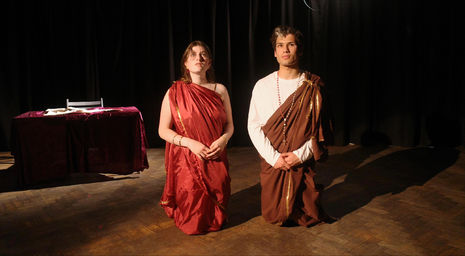Purple is the Noblest Shroud: an illumination of a figure lost to the ages
A fantastic student-written piece about the life of Theodora grapples with a restrictive space

Theodora deserves the kind of grip on our imagination that Cleopatra has. One of the most influential women in history, she rose as a commoner in the early days of the Byzantine Empire to marry the emperor Justinian, overseeing a golden age that fought off riots and plague to expand the empire to its greatest extent and construct wonders like the Hagia Sophia. Yet she has been denied a life in the visual arts. Procopius, one of the only surviving contemporary sources, all but defamed her in his Anecdota. Showing at Pembroke New Cellars this week, Edie Carter’s Purple is the Noblest Shroud is a remarkable piece of student writing with the breadth and scale of a historical epic.
The script is rich in lingual sophistication. In their first meeting, sex is latent in Justinian’s (Jacob Mellor) “burning desire to know more” of Theodora (Emily Shelley). During the Nika Revolt, we are cryptically warned that the peasants’ anger has “fuel yet to burn.” Procopius (Senan McSweeney-Davis) becomes our unreliable narrator, through which the play confronts the bias of the annals. In life, Theodora was either an actress or a prostitute; Carter configures her specifically as a circus performer, forced into sex work in order to survive. In the manner of great tragedy though, Theodora’s past never leaves her, and the play is structured by tension with a Byzantine elite who, like Procopius, belittle her as a “whore wife.”
“The scene reworks the concerns of the past to face the present; we are not so far removed from antiquity as we might think”
In one scene, Theodora complains to her confidante Antonina (adroitly played by Georgia Fullerton), “The marble has ears.” She then goes on to brag of Justinian’s sexual expertise. “I’ve heard,” teases Antonina: “The marble is thinner than you think.” It’s moments like this that have the complexity of great storytelling — I was reminded of Game of Thrones in its heyday, or more recent offerings on HBO. Nowhere is this more apparent than the forceful introduction to our heroine. Carter remembers that Theodora was the daughter of a bear trainer, Acacius, and before the Ecumenical Patriarch (akin to the pope of the Orthodox Church) she compares her experiences of assault to a youth among bears, preferring them to the horrors of men. Slyly reaching forth to the 'man or bear' debate of our modern age, the scene reworks the concerns of the past to face the present; we are not so far removed from antiquity as we might think.
Carter’s writing is standout in a way I don’t think I’ve seen of any student play before. The problem, as it were, is in confining all this to New Cellars. This is obviously not a play made for its venue, and the sparse stage (there is only a desk) places a taxing pressure on the audience to imagine everything. Theodora’s return through the streets of Constantinople sees her hurriedly walk between walk between four chorus members; the rioters are configured as a quiet voiceover. Being asked to imagine countless scenes in city streets, churches, bedrooms, something else crept forcefully to my mind — what this story might have been with the big-budget set pieces it beckoned for.
“A raw piece of student writing that calls to be restaged”
But this isn’t the production’s fault. It’s a raw piece of student writing that calls to be restaged. At one point, Mellor and Shelley gaze around the Hagia Sophia — a scene that deserved to be shot in the damn thing. “Every morning, at sunrise, the dome is minted anew,” rues Theodora, bitter that her own name will be lost to history. It becomes clear that this informs her ambitions to grow the empire west, so that she might be preserved in record. Between them, Carter and Shelley give us their own spin on Shakespeare’s Cleopatra and her “infinite variety,” as Theodora becomes increasingly power-hungry without ever fully losing her humanity. Seemingly liberating a group of prostitutes in one scene, she encounters one (Sophia O’Callaghan) whose daughter has been taken by the child’s father. And so we have an emotional impetus for Theodora’s most famous reform to Byzantine law, cementing women’s custody rights.
But she remains impetuous to the end. When a stranger enters the city claiming to be her long-lost son, Theodora reveals her infertility resulting from the child. “Not made for motherhood,” she proves this point by casting the man off to the furthest ends of the empire, determined that Justinian should never find out. This is a character whose ambitions are never far from the surface. “I used to think I had the kind of soul that couldn’t be saved,” she gushes shortly after her marriage. So rich is this characterisation that I honestly don’t believe her. She may truly love her husband, but our empress is never too far removed from her performer days — a past that neither she, nor we, are made to forget.
This production does stumble in parts, I can’t lie, although most of the time this emerges from trying to conform to the limited offerings of New Cellars. Too often actors looked to fill the sparse stage by animating themselves. My advice would be to go slow; the characterizations are baked in with the fine dialogue and don’t rely on affectation to be drawn out. I also don’t understand the decision to make the Patriarch a disembodied voiceover provided by Brian Joseph. The delays between Shelley and the tech cues prevent what could have been a more forceful confrontation between actors on stage.
I hovered over what to rate this. I think what I’ve chosen speaks to the breadth of ambition in its script and playwright. If the struggle with this play comes in trying to shrink itself to the space of New Cellars, that only proves that it deserves a life beyond. “How will you remember me?” Theodora asks us at the end, breaking the fourth wall before being wrapped up in her purple funeral shroud. All I could think is that this shouldn’t be goodbye. Get this out of Pembroke and let it stake its claim as the next Shōgun.
Purple Is The Noblest Shroud is showing at Pembroke New Cellars from Tuesday 6th to Saturday 10th May at 7:00pm.
Want to share your thoughts on this article? Send us a letter to letters@varsity.co.uk or by using this form.
 News / Right-wing billionaire Peter Thiel gives ‘antichrist’ lecture in Cambridge6 February 2026
News / Right-wing billionaire Peter Thiel gives ‘antichrist’ lecture in Cambridge6 February 2026 Features / From fresher to finalist: how have you evolved at Cambridge?10 February 2026
Features / From fresher to finalist: how have you evolved at Cambridge?10 February 2026 Film & TV / Remembering Rob Reiner 11 February 2026
Film & TV / Remembering Rob Reiner 11 February 2026 News / Churchill plans for new Archives Centre building10 February 2026
News / Churchill plans for new Archives Centre building10 February 2026 News / Epstein contacted Cambridge academics about research funding6 February 2026
News / Epstein contacted Cambridge academics about research funding6 February 2026










